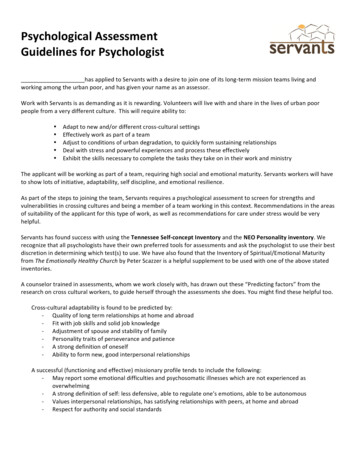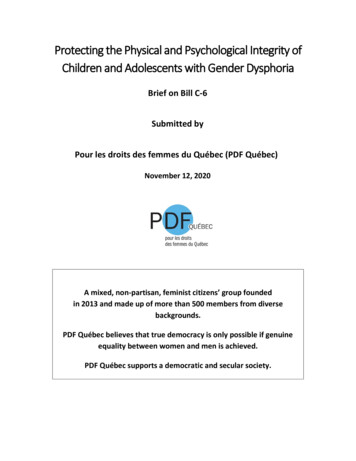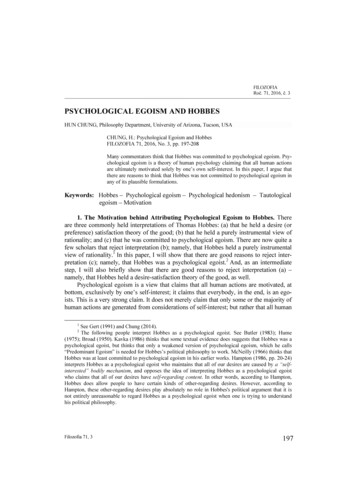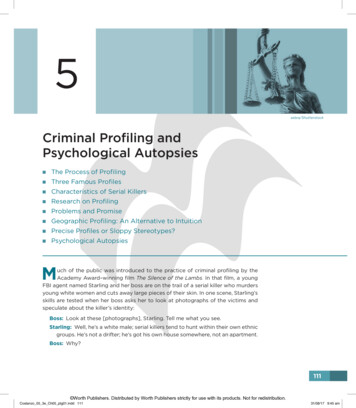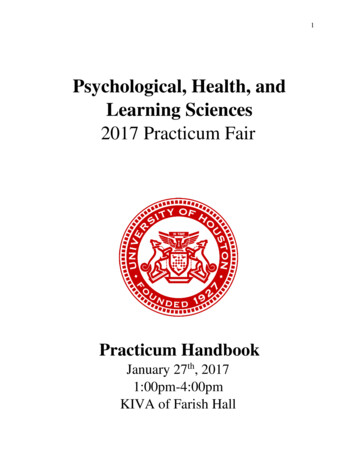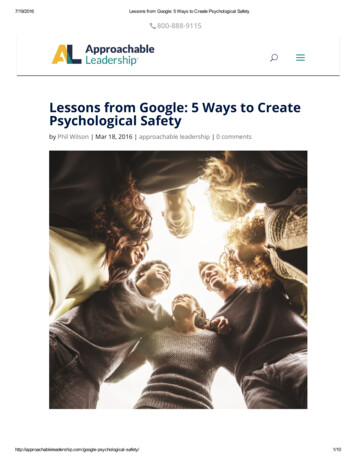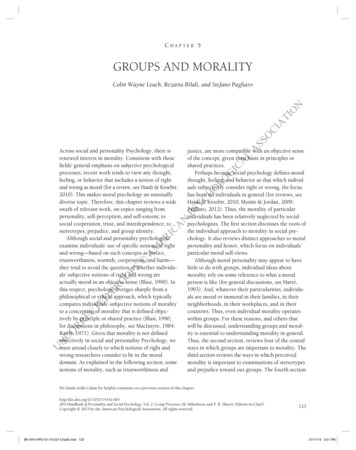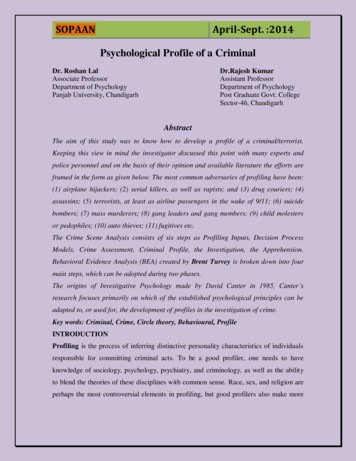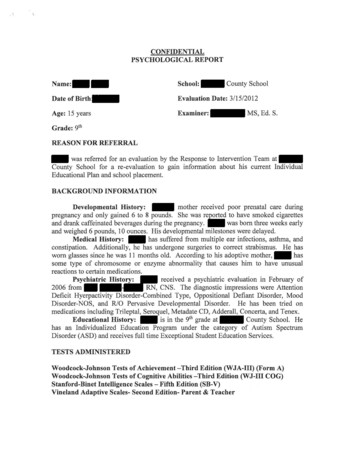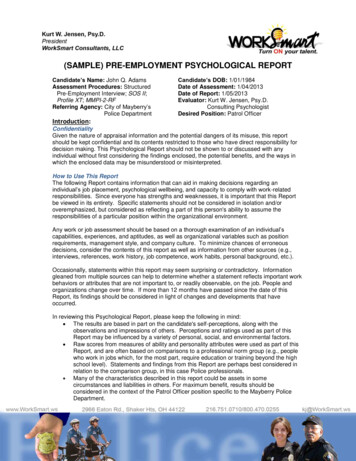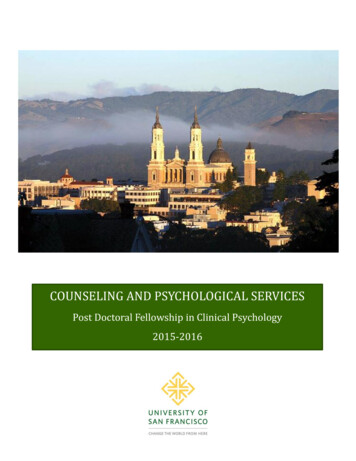
Transcription
COUNSELING AND PSYCHOLOGICAL SERVICESPost Doctoral Fellowship in Clinical Psychology2015-2016
TABLE OF CONTENTSSettingOverview of the University of San Francisco 1Vision, Mission, & Values of the University of San Francisco 2Student Life Mission Statement 3CAPS Mission Statement 3CAPS Diversity Statement 4CAPS Staff 5Accreditation Status 6Overview of the Fellowship Training ProgramTraining Philosophy, Program Goals and Objectives 7Post Doctoral Fellow Roles 9Overview of Training Year 11Training Program Activities 13Weekly Hours 17Evaluations 18Problem ResolutionDue Process and Grievance Procedures 20Rights and Responsibilities 20Personnel MattersQualifications 21USF Equal Opportunity and Non-Discrimination Policy 21USF Background Check Policy 21Length of Contract 21Stipend and Benefits 22Professional Development 23Liability Insurance 23
TABLE OF CONTENTSWeekly Log 24Time Keeping 24Dress Code 24Request for Leave 25Training Policies and ProceduresEthical and Professional Conduct 26Professional Disclosure Statement 26Supervision Agreement and Verification of Experience 26Respsonsibilities of Supervisors 26Respsonsibilities of Supervisees 27Recording of Sessions 27Case Conference Considerations 27Completion of Fellowship 27Training Quick Links 27
USF CAPS POST DOCTORAL FELLOWSHIP MANUALOverview of the University of San FranciscoThe University of San Francisco is an independent, private, non-profit institution of highereducation and one of 28 Jesuit Catholic colleges and universities in the United States. TheCounseling and Psychological Service (CAPS) is located on our beautiful 55-acre main campus,which sits atop a hill next to Golden Gate Park,overlooking downtown San Francisco and the PacificOcean.Classified as a Doctoral/Research and CommunityEngaged University under the Carnegie Foundationclassification system, University of San Francisco ischaracterized as balancing arts, sciences, and theprofessions at the undergraduate level; as doctoralprofessional dominant at the graduate level; with themajority of its students being undergraduates; asselective, with a high level of transfer-in students;and as a medium-sized, four-year, and primarilyresidential institution.The University of San Francisco is accredited by theWestern Association of Schools and Colleges(WSCUC) and in 2009, WSCUC reaffirmed USF’saccreditation for 10 years. The University is alsoaccredited by several professional accreditingbodies, including, but not limited to, the AmericanBar Association (ABA), the California Commission on Teacher Credentialing, AACSB International–The Association to Advance Collegiate Schools of Business, and the Commission on CollegiateNursing Education (CCNE). Undergraduate majors are offered in the College of Arts and Sciences,the School of Education, the School of Management, and the School of Nursing and HealthProfessions. Graduate degrees are offered in the School of Law in addition to the aforementionedschools.As of September 2014 (the most recent census date), the University of San Francisco enrolled10,701 students, including 6,745 undergraduate students, 3,274 graduate students, 557 lawstudents, and 152 special/non-degree students. Over 90 percent of freshmen and approximately40 percent of all undergraduate students live on campus. The student body (37 percent male and63 percent female) represents multiculturally diverse ethnic, religious, and socioeconomicPage 1
USF CAPS POST DOCTORAL FELLOWSHIP MANUALbackgrounds, 49 states and 87 countries. According to the 2015 U.S. News & World Report, theUniversity is listed as a Tier One National University, rated as 8th in undergraduate student ethnicdiversity, and 7th for percentage of international students, among 280 national universities.VISION, MISSION, & VALUES OF THE UNIVERSITY OF SAN FRANCISCOCentral to the mission of the University of San Francisco is the preparation of students to shape amulticultural world with generosity, compassion, and justice. The institution’s Vision, Mission, andValues Statement captures the essence of this commitment in its opening paragraph: “TheUniversity of San Francisco will be internationally recognized as a premier Jesuit Catholic, urbanUniversity with a global perspective that educates leaders who will fashion a more humane andjust world.” This mission permeates all aspects of the institution, including student learning andfaculty development, curriculum design, program and degree offerings, student services, alumnirelations, publications, and a host of other institutional features. USF’s commitment to the JesuitCatholic tradition is embedded in every major in every program(http://www.usfca.edu/about/jesuit/). There is a strong emphasis on academic rigor and socialjustice with constant attention to the societal impact of academic work.The University’s core values include a belief in and a commitment to advancing: the Jesuit Catholic tradition that views faith and reason as complementary resources in thesearch for truth and authentic human development, and that welcomes persons of allfaiths or no religious beliefs as fully contributing partners to the University; the freedom and the responsibility to pursue truth and follow evidence to its conclusion; learning as a humanizing, social activity rather than a competitive exercise; a common good that transcends the interests of particular individuals or groups; andreasoned discourse rather than coercion as the norm for decision making; diversity of perspectives, experiences and traditions as essential components of a qualityeducation in our global context; excellence as the standard for teaching, scholarship, creative expression and service to theUniversity community; social responsibility in fulfilling the University’s mission to create, communicate and applyknowledge to a world shared by all people and held in trust for future generations; the moral dimension of every significant human choice: taking seriously how and who wechoose to be in the world;Page 2
USF CAPS POST DOCTORAL FELLOWSHIP MANUAL the full, integral development of each person and all persons, with the belief that noindividual or group may rightfully prosper at the expense of others; a culture of service that respects and promotes the dignity of every person.STUDENT LIFE MISSION STATEMENTThe Counseling and Psychological Service CAPS) is housed under the Division of Student Life.Consistent with the overall University mission, the mission of Student Life is to fully supportholistic student development within a socialjustice framework, centered in preparingstudents to be caring, socially responsiblecitizens in our global and local communities.CAPS MISSION STATEMENTThe mission statement of Counseling andPsychological Services emphasizes the full,integral development of each and all personsby providing students with mental healthservices that allow them to improve andmaintain their mental well-being and to meettheir educational, personal, emotional, andspiritual goals. Our goal is to assist USF students’ learning by helping reduce psychologicalsymptoms and developmental stressors, cope with difficult life events and balance academic andsocial life. CAPS accomplishes these functions by providing high-quality, time-effective, andculturally sensitive counseling, consultation, outreach, and training that honors the diversity ofperspectives, experiences and traditions inherent in our population and central to the University’score values.Page 3
USF CAPS POST DOCTORAL FELLOWSHIP MANUALCAPS DIVERSITY STATEMENTRespect for diversity is a central value of both the University of San Francisco and CAPS and isconsistent with the profession of psychology as outlined by the American PsychologicalAssociation’s Ethical Principles and Code of Conduct (2002) and discussed in the Guidelines andPrinciples of Programs in Professional Psychology (APA, 2005).CAPS is committed to the values of respect for diversity, inclusion, equity, and self-examination in atraining environment of mutual respect. CAPS licensed staff and trainees are encouraged toexamine their attitudes, assumptions, behaviors, and values, and to develop understanding of andsensitivity to individual and cultural diversity, while integrating such understanding into all formsof service delivery. CAPS staff members have a commitment to ongoing learning that continues toenhance our work with “cultural, individual, and role differences including those based on age,gender, gender identity, race, ethnicity, culture, national origin, religion, sexual orientation,disability, language, and socioeconomic status” (APA Ethics Code, 2002, Principle E, p. 1063).Training staff will engage trainees in a manner respectful of their multiple cultural identities andprovide equal access, opportunity, and encouragement inclusive of these identities. Training staffwill examine their own biases and prejudices in the course of their interactions with trainees so asto model and facilitate this process.In summary, CAPS training staff and trainees are committed to a training process that facilitatesthe development of professionally relevant knowledge and skills focused on working effectivelywith all individuals inclusive of demographics, beliefs, attitudes, and values. Consistent with theUniversity’s Mission, we welcome, expect, and encourage the pursuit of “a more inclusivecommunity, which celebrates diversity and works toward justice”.Adapted from the Counseling Psychology Model Training Values Statement Addressing Diversity, Mintz,L. B., & Bieschke, K. J. (2009). Counseling psychology model training values statement addressing diversity.The Counseling Psychologist, 37, 634-640; endorsed by the Association of Counseling Center Training Agencies(ACCTA), the Council of Counseling Psychology Training Programs (CCPTP), and the Society for CounselingPsychology (SCP) in August of 2006.Page 4
USF CAPS POST DOCTORAL FELLOWSHIP MANUALCAPS STAFFThe USF-CAPS licensed staff members are generalists who approach their work with students from anintegrationist perspective. Some areas of interest include supervision and training, multiculturaldevelopment, identity formation, LGBTQ support, brief therapy, feminist therapy, bilingual counseling,community education, mindfulness, client resilience, and supporting the growth of intersecting identities.Some of our clinical interests include trauma, mood and anxiety disorders, eating disorders, alcohol andother drug intervention, grief and bereavement, and healthy relationships.LICENSED STAFFBarbara Thomas, Ph.D.Senior DirectorCalifornia Licensed Psychologist, PSY 9955Counseling Psychology, Arizona State UniversityNancy Glenn, Ph.D.Training DirectorCalifornia Licensed Psychologist, PSY 10097Counseling Psychology, Colorado State UniversityMolly Zook, Psy.D.Assistant Director for OperationsCalifornia Licensed Psychologist PSY 19072Clinical Psychology, California Institute of Integral StudiesAlbert Meza, Ed.D.Staff PsychologistCalifornia Licensed Psychologist, PSY15981Counseling Psychology, Harvard UniversityYen-Jui (Ray) Lin, Ph.D.Staff Psychologist/Outreach CoordinatorCalifornia Licensed Psychologist, PSY 26127Combined Counseling/Clinical/School Psychology Program,University of California, Santa BarbaraPage 5
USF CAPS POST DOCTORAL FELLOWSHIP MANUALBenjamin Molland, Psy.D.Staff PsychologistCalifornia Licensed Psychologist, PSY 26753Clinical Psychology, University of DenverPeggy Yang, Ph.D.Staff PsychologistCalifornia Licensed Psychologist, PSY 22376Combined Counseling/Clinical/School Psychology Program,University of California, Santa BarbaraADMINISTRATIVE STAFFMichelle ParragaOffice ManagerRenee Harrison, B.A.Office AssistantACCREDITATIONCounseling and Psychological Service is accredited by the International Association of CounselingServices (IACS) and the Internship Program is a member of the Association of Psychology PostDoctoral and Internship Centers (APPIC). The Doctoral Internship in Clinical Psychology trainingprogram was awarded full APA accreditation in November 2013. Questions related to theprogram's accredited status should be directed to the Commission on Accreditation at:Office of Program Consultation and AccreditationAmerican Psychological Association750 1st Street, NE, Washington, DC 20002Phone: (202) 336-5979 or (202) 336-6123 TDD/ E-mail: apaaccred@apa.orgWeb: www.apa.org/ed/accreditationPage 6
USF CAPS POST DOCTORAL FELLOWSHIP MANUALOVERVIEW OF THE FELLOWSHIP PROGRAMTRAINING PHILOSOPHY, PROGRAM GOALS AND OBJECTIVESThe USF Counseling and Psychological Services(CAPS) has a strong commitment to training thatincludes participation of all staff. The trainingprogram is cumulative and sequential, supportingand enhancing knowledge and skills that fellowspossess while also providing didactic andexperiential opportunities that facilitatedevelopment of their professional identities aspsychologists. CAPS is consistent with USF’s Corevalue of having a commitment to the “full, integraldevelopment of each person,” by providing atraining program that facilitates the developmentof ethical, competent, generalist psychologists whocan function independently and make positivecontributions to the profession. Best described asa practitioner model, an emphasis is placed upongrounding clinical practice in theory and researchand the development of mentoring relationshipswith supervising psychologists.CAPS is committed to a brief therapy approach to clinical practice that is grounded in evidencebased treatment. We believe that the important aspects of training in brief therapy include: 1) anattitudinal shift on the part of the therapist, to see brief therapy as efficacious and oftentimesconsidered as the treatment of choice; 2) an exposure to a multiplicity of therapeutic frames andmethods, with a focus on adapting them to brief work; 3) an insistence, to the extent possible, thattherapeutic frame and method be fitted to the client rather than the reverse; 4) an integration of amulticultural perspective into both case formulation and an interactive approach to the client; and5) an emphasis on continual practice in defining a focus with the client, and in orienting thetherapy to that focus and its associated therapeutic goals.Also in line with our sponsor institution’s “belief in and commitment to a diversity ofperspectives,” our training in brief therapy is based on an integrationist approach. Our approachincorporates various theoretical models and interventions, while keeping in mind individual,Page 7
USF CAPS POST DOCTORAL FELLOWSHIP MANUALcultural, and societal considerations. These ideal characteristics of a multicultural, integrationistapproach to brief therapy are not simply actualized in some absolute fashion, even by experiencedstaff members. Rather, they represent orienting considerations that inform our work and trainingin an ongoing fashion. We see training as a process where we share our struggles and questions,our successes and failures, as a group. In the end, we are committed to assisting fellows indeveloping their own perspectives toward brief therapy and moving closer to the integration ofevidence-based frameworks and methods with the goal of preparing the fellow for a staffpsychologist position in a university counseling center.The Postdoctoral fellowship program provides generalist training over the course of the year.Fellows continue to enhance and solidify the development of clinical skills required for theprofessional practice of psychology with advanced training and supervision in brief individualpsychotherapy, group therapy, crisis intervention and management, on-call coverage, clinicalassessment and intake evaluation, consultation, outreach program development and delivery, andcommittee work. In addition, the Post Doctoral Fellow further develops administrative skills byoverseeing a project or program central to USF-CAPS; projects are based on the current need ofthe Center and experience/capabilities/interests of the fellow. Projects have included outreachcoordination, training administration, oversight of alcohol and other drug intervention, analysis ofclient outcome data, and coordination of triage.Fellows will further develop their understanding of and sensitivity to individual and culturaldiversity, and will integrate such understanding into all forms of service delivery. In addition,fellows will obtain greater awareness and competence in program evaluation, supervision, and theapplication of ethical principles and laws as well as advancing their professional identity as apsychologist.Our overarching program goals and objectives are the following:Goal 1: Develop and demonstrate skills and competencies for entry-level practice as aUniversity Counseling Center Psychologist.Objective 1: Implement assessment and clinical therapy skills required for the professionalpractice of psychology.Objective 2: Implement crisis intervention and management strategies.Objective 3: Consult and collaborate with on-campus and off-campus communities.Objective 4: Create and deliver outreach programming.Objective 5: Work with culturally diverse individuals, groups, and communities in an appropriateand effective manner.Page 8
USF CAPS POST DOCTORAL FELLOWSHIP MANUALObjective 6: Design and implement a program evaluation.Goal 2: Develop
Respect for diversity is a central value of both the University of San Francisco and CAPS and is consistent with the profession of psychology as outlined by the American Psychological Association’s Ethical Principles and Code of Conduct (2002) and discussed in the Guidelines and Principles of Programs

